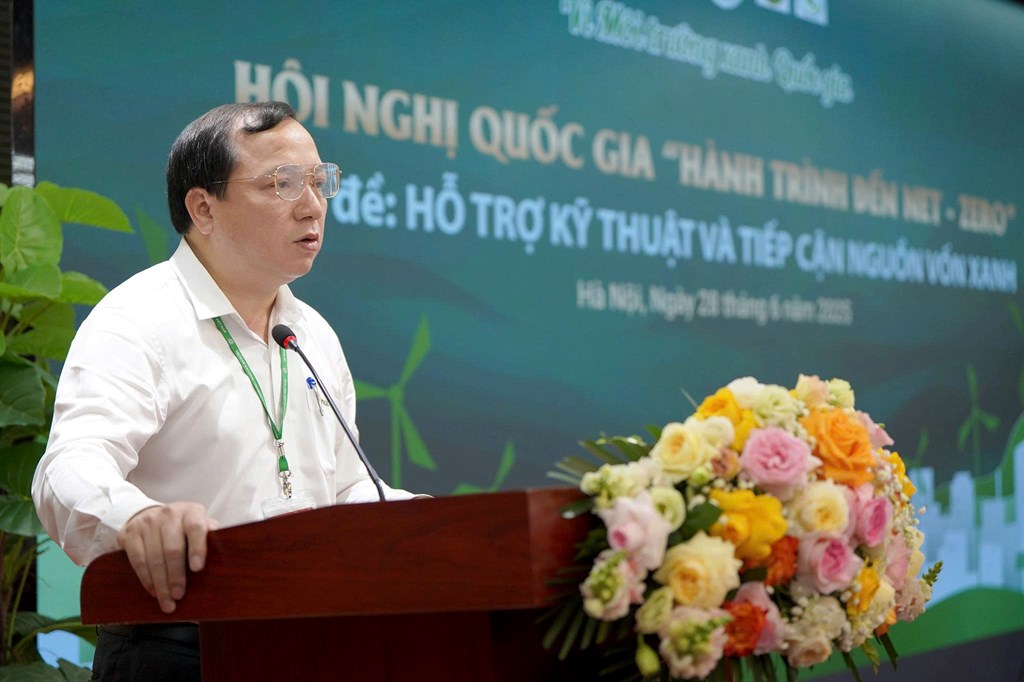
As the goal of achieving net-zero emissions becomes a mandatory commitment, many businesses are still struggling with greenhouse gas (GHG) inventories and accessing green finance – both critical for transitioning to a sustainable growth model.
This issue was addressed at the national conference “Journey to Net Zero: Technical Support and Access to Green Finance,” held on June 28 in Hanoi. The event was organized by the Institute for Green Growth Research (Vietnam Academy of Agriculture) in collaboration with provincial Departments of Agriculture and Environment.
Greenhouse gas inventories: a mandatory step toward Net Zero
In his opening remarks, Associate Professor Dr. Vu Ngoc Huyen, Vice Chairman of the Council of the Vietnam Academy of Agriculture, stated that the Net Zero target is no longer optional – it is an urgent societal mission. Realizing the commitments made at COP26 requires the collective effort of political systems, businesses, and citizens.
Vietnam’s roadmap to Net Zero has been supported by a progressively complete legal framework, notably Decree No. 06/2022/ND-CP and Decision No. 13/2024/QD-TTg. Over 2,100 major emitters in sectors such as industry, transport, construction, natural resources, and environment have been identified and are required to report their GHG emissions every two years.
Conducting thorough GHG inventories is a foundational step in achieving Net Zero. It allows businesses to gain a comprehensive view of their emissions profile, identify cost-effective reduction measures, enhance transparency, and build a sustainable brand image. This is also essential for entering the domestic carbon credit market, which is set to pilot in 2027 and aims to attract long-term green investment.
Despite opportunities, businesses face challenges – from processing vast data volumes to applying complex calculations. This demands swift development of internal capabilities and refined procedures to meet new regulatory standards.
Delays or errors in inventory processes can lead to legal risks and damage corporate reputations, especially as international supply chains adopt stricter environmental standards.
Experts reiterated that the Net Zero journey must start with emissions tracking. Decision No. 13/2024/QD-TTg and Decree No. 06/2022/ND-CP clearly mandate periodic inventories for over 2,100 major emitters. Small and medium enterprises will also be subject to reporting if their emissions exceed 3,000 tons of CO₂ equivalent annually or energy use surpasses 1,000 TOE.
Dr. Nguyen Sy Linh from the Institute for Agricultural and Environmental Policy Strategy recommended that 2025 be used as a trial phase for internal inventories, giving businesses time to prepare before the official mandate begins in 2026. According to Dr. Linh, emissions tracking is not just a legal obligation but also an opportunity for companies to understand their carbon footprint, propose solutions, and prepare for the carbon market expected to launch in 2028.
Building internal capacity to access sustainable finance
Experts at the conference noted that the biggest barrier is not a lack of funding, but the absence of qualifying documentation. To secure support from the Green Climate Fund (GCF), Adaptation Fund (AF), or the Vietnam Environment Protection Fund, businesses must provide transparent financial reports, complete environmental documents, and demonstrate project sustainability.
The Vietnam Environment Protection Fund currently offers preferential loans with interest rates between 2.6% and 3.6% per year, with terms of up to 10 years – providing practical support for businesses pursuing environmental projects.
Dr. Dinh Thi Hai Van of the Institute for Green Growth Research introduced actionable steps that companies can begin immediately, such as measuring emissions, implementing energy-saving solutions, developing mid-term action plans with clear reduction targets, and selecting appropriate carbon offset methods.

Green transition and Vietnam’s Net Zero commitment
Experts emphasized that Net Zero is not just an internal goal but a prerequisite for participating in global supply chains. New regulations, including the EU’s Deforestation Regulation (EUDR) effective from 2025 and the Carbon Border Adjustment Mechanism (CBAM) from 2026, set high standards for traceability and production transparency, requiring timely adaptation from businesses.
Trinh Quang Han from the Central Policy and Strategy Committee remarked that green transition pioneers gain a distinct advantage in branding and long-term investment access.
Dr. Nguyen Hoang Hiep, Director of the Institute for Green Growth Research, stressed that the conference marks a vital launchpad for Vietnamese businesses to confidently enter a new phase of transformation – not just to comply with legal frameworks, but to seize opportunities in the era of green growth.
At the event, organizers and pioneering firms like Mai Hoa Group and Vietnam Cinnamon Star Anise Production and Export JSC signed the “Green Commitment,” demonstrating their readiness to accompany the government in achieving national Net Zero goals.
PV





